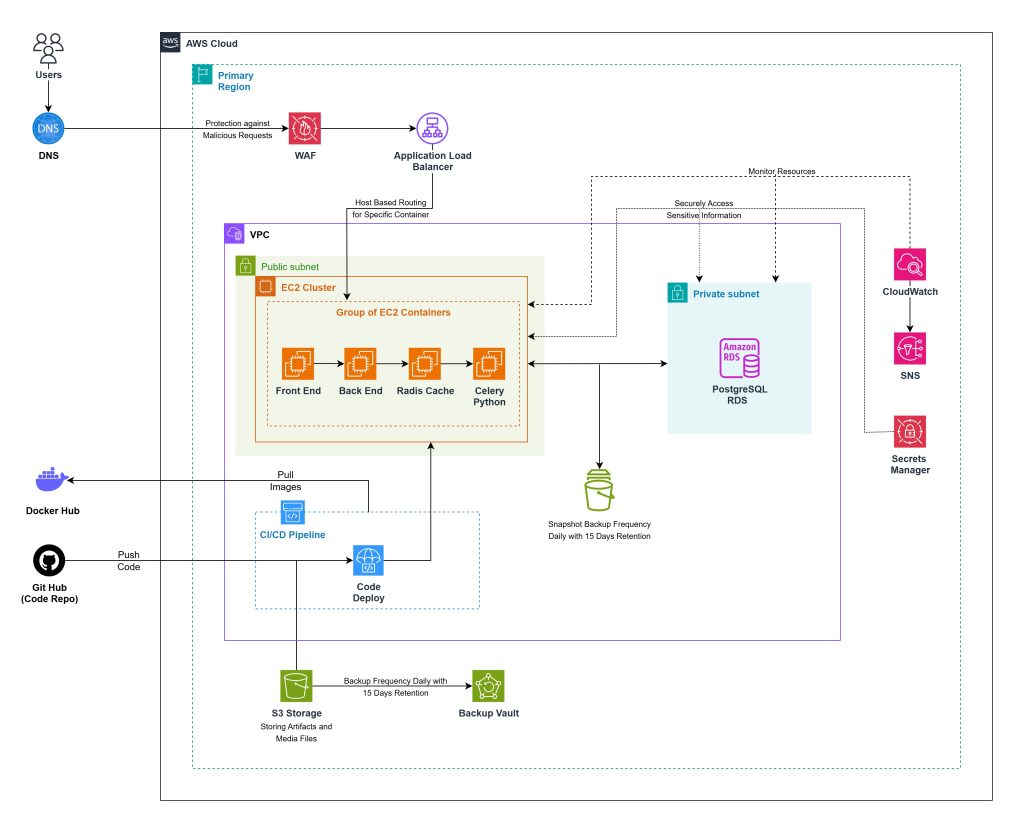VIEZU Technologies is a UK-based automotive tuning company specializing in ECU remapping, performance upgrades, and custom tuning solutions for petrol and diesel vehicles. Renowned for its in-house R&D and software development, VIEZU offers tailored tuning services and distributes professional-grade tools like Alientech POWERGATE, Autotuner, ECM Titanium, and bFlash.
Viezu Case Study
Background
Objective
The objective was to build a scalable, secure, and highly available cloud infrastructure to host both their Angular-based frontend and Python-based backend applications. The goal is to streamline deployment workflows, enhance operational efficiency, and ensure high availability and data protection through CI/CD automation, centralized monitoring, and secure resource management.
Industry / Domain
Viezu Technologies operates within the dynamic Automotive Technology sector, specifically focusing on Vehicle Performance Optimization and Engine Control Unit (ECU) Remapping. This domain encompasses digital and mechanical solutions that enhance engine performance, fuel efficiency, and driving experience across a wide range of vehicles. The industry is driven by the demand for precision tuning, compliance with emissions standards, and integration with increasingly complex vehicle electronics.

Technology Stack

Features
- Automated CI/CD pipeline with GitHub integration and Docker Hub for containerized image deployment.
- Frontend (Angular) and backend (Python/Django with Celery) hosted in EC2 containers with centralized ALB exposure.
- Secure architecture with WAF integrated at ALB level to mitigate web threats.
- Segregated public and private subnets ensuring controlled access to RDS.
- Daily snapshot backups for EC2 and RDS instances with 15-day retention policy
- Application artifacts and media files stored in Amazon S3, with backups secured in AWS Backup Vault.
- Centralized monitoring and alerting using CloudWatch and SNS integration for proactive issue detection.
- Secrets and credentials securely managed via AWS Secrets Manager.
Challenges
- Ensuring seamless deployment pipeline integration between GitHub, Docker Hub, and AWS CodePipeline for containers.
- Maintaining application availability and scalability within EC2 clusters across public subnets.
- Mitigating data loss risks with effective backup strategies while optimizing storage costs.
- Implementing secure communication between services while managing secrets and credentials.
- Providing real-time monitoring and alerting for multiple components (EC2 cluster, RDS, containers).
Solution Delivered
- Designed a hybrid subnet architecture with ALB and EC2 containers in public subnets, and PostgreSQL RDS deployed securely in private subnets.
- Implemented AWS WAF on the Application Load Balancer for enhanced application security against common web exploits.
- Established CI/CD automation using AWS CodePipeline and CodeDeploy: GitHub commits trigger build pipelines, with Docker Hub images pulled automatically and deployed to EC2 containers.
- Configured AWS Backup Vault to manage daily backups across EC2, RDS, and S3 with an automated 15-day retention policy.
- Integrated CloudWatch metrics and logs with SNS notifications for proactive monitoring and faster incident response.
- Secured environment using AWS Secrets Manager to manage API keys, database credentials, and other sensitive configurations
- Utilized Redis cache and Celery task manager for efficient background processing, cron jobs, and task execution.
Benefits
- Scalability and Flexibility: Containerized architecture supports rapid scaling of frontend and backend services.
- Enhanced Security: Layered security with WAF, private subnet isolation, and Secrets Manager.
- Operational Efficiency: Fully automated CI/CD pipelines reduce manual intervention and deployment errors.
- Data Protection: Daily snapshots combined with S3 backups and retention policies ensure business continuity and disaster recovery readiness.
- Proactive Monitoring: CloudWatch and SNS integration enable real-time tracking and alerting for improved platform reliability.
- Cost Optimization: Single-AZ deployment with controlled retention and backup policies reduces unnecessary costs while meeting operational needs.
- Improved Developer Agility: GitHub commits automatically flow through CI/CD, accelerating deployment cycles and innovation.


